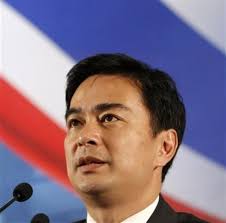On the streets of Bangkok, a frenzied clean-up was under way to ... Many wore T-shirts printed with a slogan that read "Together We Can" and a .... Psychiatric care to rural people led to trauma. Help them now! ...
Reporter: Arwee
Thailand's prime minister said that Bangkok would get back to business after a massive clean-up, and defended a crackdown on protest rallies that unleashed a rampage of arson and looting.
Tourists walk through a street strewn with rubbish in central Bangkok on May 22. Thailand's premier has said the capital was calm and returning to normal after a massive clean-up, and defended a crackdown on protest rallies that unleashed a rampage of arson and looting.
Prime Minister Abhisit Vejjajiva said that schools, streets and government agencies would reopen after being shuttered to keep civilians out of central Bangkok during clashes between security forces and "Red Shirts" protesters. The stock exchange was also due to resume trading for the first time since Wednesday, when it was one of 36 major buildings torched as enraged militant Reds went on the rampage after their leaders were forced to surrender. "Everything is calm and returning to normalcy," Abhisit said in his regular Sunday television address, appearing relaxed and confident as two months of crisis that has left 86 dead and 1,900 injured abated.
However, authorities extended until Tuesday a curfew in force for four nights in Bangkok and 23 other provinces, saying the measures would remain in place "for security reasons."
During the curfew late, police said a shooting attack on a bank in the north of the capital shattered the glass doors of the building, but nobody was wounded in the incident. On the streets of Bangkok on Sunday, a frenzied clean-up was under way to remove tonnes of debris and garbage after the offensive on a protest encampment that had paralysed the shopping district for six weeks. Hordes of workers and volunteers, including foreigners, scraped away political graffiti and posters, wielded power hoses and poured foaming detergent to scrub the streets clean. Many wore T-shirts printed with a slogan that read "Together We Can" and a heart drawn in the colours of the Thai flag.
The week before was terrible in Bangkok and so many help clean up the city. I think it's part of the healing process," said a Dutch teacher living in the capital. Abhisit defended the security authorities' conduct in the final crackdown, saying the use of weapons "was based on international standards. Weapons were used for self defence and to establish peace and order".
The government has displayed a huge cache of arms it said had been collected from the ruins of the rally encampment, to quash criticism from international rights groups as well as the Reds who said they were unarmed. However, Abhisit admitted there were serious concerns over fighting at a temple within the Reds' camp which had been designated a "safe zone" but where six bodies were found after the protest's chaotic dispersal.
"The most distressing were the deaths at the Pathum Vanaram temple," he said, maintaining there was no military action at the time of the shootings but that the events would be investigated by an independent committee.
Concern has been growing over rights abuses in Thailand, with the European Union the latest to call on the authorities to respect the rights of protesters and saying the violence had harmed the nation. Human Rights Watch has also expressed alarm over a "draconian" emergency decree introduced during the crisis to hold prisoners in secret detention. Abhisit said he would proceed with a reconciliation "road-map" aimed at healing Thailand's deep divide, but gave no confirmation of the elections that are a key demand of the Red Shirts.
"I have already said that new elections would only be held after the rallies ended, and on condition that there was peace," he said. Abhisit has admitted that Thailand faces "huge challenges" in the aftermath of the rally campaign by the Reds, who are pushing for the ouster of his government which they see as illegitimate. The Reds are mostly supporters of former prime minister Thaksin Shinawatra, who was removed in a 2006 coup. The billionaire was accused of gross rights abuses and corruption, but won grass-roots support with his populist policies.
Thaksin's elected allies were later ejected in a controversial court ruling, paving the way for Abhisit's administration to be appointed in a 2008 army-backed parliamentary vote.
Video and photo album - on display in our forum article - click here



No comments:
Post a Comment